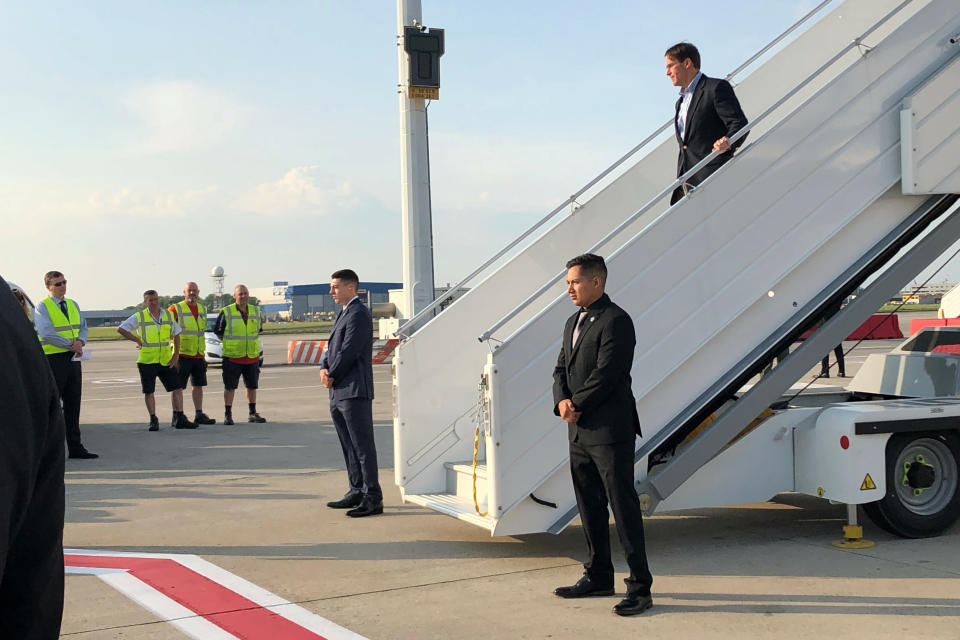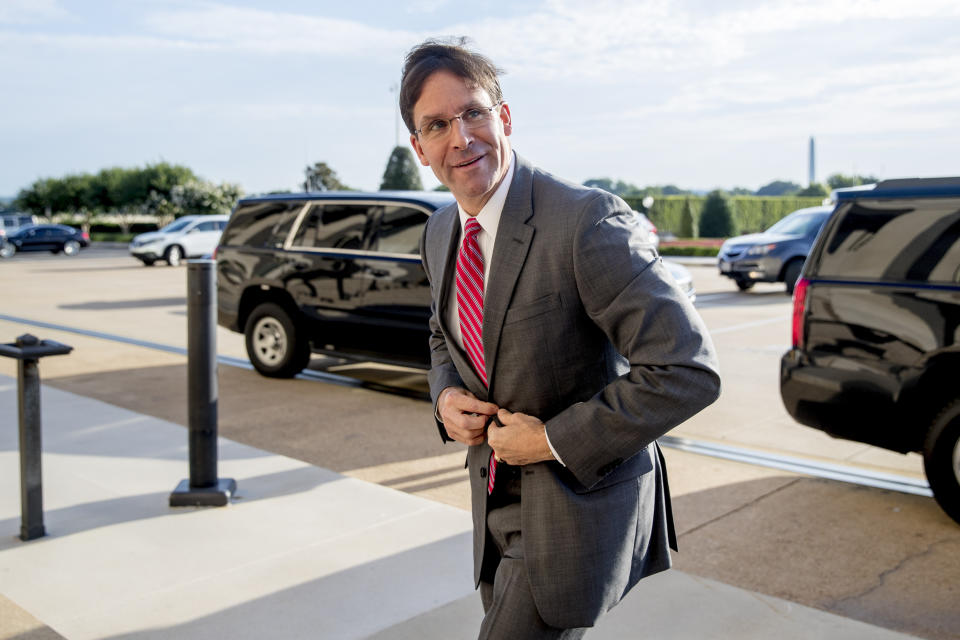New Pentagon chief seeks Europe's help for Trump's Iran view
BRUSSELS (AP) — The Trump administration aims to persuade allies the confrontation with Iran, which threatened to worsen into a deadly shooting war last week, is "not Iran versus the United States" but rather a global challenge requiring global diplomacy, the new acting Pentagon chief said Tuesday.
Speaking to reporters traveling with him to a meeting of NATO defense ministers in Brussels, Mark Esper said he wants to help form a broader coalition to deter Iran and compel its leaders to return to the negotiating table for nuclear talks.
President Donald Trump, who withdrew the United States last year from an international deal to limit Iran's nuclear program and then reinstated harsh economic sanctions, says he wants to work out an even more restrictive deal with Tehran. Iran, however, denounced the latest U.S. sanctions as "idiotic" and an obstacle to talks.
On Tuesday, Trump responded in kind, lashing Iran's leaders for rejecting his overtures and vowing that "any attack by Iran on anything American" would be answered with overwhelming U.S. military force that "in some areas" would mean "obliteration."
Acting Defense Secretary Esper's arrival in Europe was meant to reinforce a message delivered this week by Secretary of State Mike Pompeo, who conferred with leaders in Saudi Arabia and the United Arab Emirates about countering any military threat from Iran by building a broad coalition that includes Asian and European countries. Officials said they hope this will include a wider international effort to monitor shipping in the Persian Gulf to deter Iranian attacks.
Esper faces a tall order, however. His first major appearance in his new job will be Wednesday at NATO, the alliance that Trump has frequently bashed as a collection of freeloaders.
And European leaders have appeared cool to the U.S. approach to Iran. Europe wants more emphasis on minimizing the chances of war, especially after the events of last week when Trump approved military retaliation for the shooting down of an American military drone aircraft but withdrew the order at the last minute. Since then, the administration has publicly emphasized its goal of "internationalizing" the Iran crisis.
"This is not Iran versus the United States. This is Iran certainly versus the region, and arguably the broader global environment," said Esper, who took over Monday as acting secretary, replacing Patrick Shanahan, who resigned last week.
Esper said his goal is, first, for allies to express outrage at Iran's activities, which the U.S. says include the drone shootdown and bombings of several tanker ships in the Gulf of Oman. Second, he said he wants allies to support "any range of activities" to help deter conflict with Iran.
"This is the reason why we need to internationalize this issue and have our allies and partners work with us to get Iran to come back to the negotiating table and talk about the way ahead," he said.
Esper said discussions about creating a maritime coalition to secure freedom of navigation in the Persian Gulf are still in the early stages. It's too early, he said, to start "counting ships" and which allies have agreed to participate.
Germany, France and Britain, as well as Russia and China, remain part of the nuclear deal that Trump abandoned last year. The 2015 agreement aimed at curbing Iran's nuclear ambitions in exchange for relief from economic sanctions.
Because of the unusual circumstance of being an acting defense secretary -- replacing Shanahan, who also had not been confirmed by the Senate -- Esper faces the added challenge in Brussels of assuring his international counterparts and military commanders in the region that the U.S. military is in stable and capable hands.
Esper, 55, was a top lobbyist for the defense contractor Raytheon Co. before becoming Army secretary in November 2017. A West Point classmate of Pompeo, Esper served in the 1991 Gulf War with the 101st Airborne Division and retired from the Army in 2007 after 10 years on active duty and 11 in the National Guard and Army Reserve.
This is by far the longest period the Pentagon has ever gone without a Senate-confirmed secretary. Trump's first defense chief, Jim Mattis, resigned in December in protest of Trump's policies and what the retired four-star Marine general considered Trump's destructive approach to allies.
The two-day NATO meeting of defense ministers will include talks on many of the most worrisome international security topics: possible war with Iran; the ongoing conflict in Afghanistan; the continued fight against Islamic State militants in Syria and Iraq, and tensions with Russia. Esper, who until Sunday evening had been serving as the civilian leader of the U.S. Army, may be familiar with many of the issues, but to European defense ministers he is a relative unknown.
"Expectations are really low. They are not going to expect him to be able to speak authoritatively for the president and go beyond what's in his talking points," said Derek Chollet, who served in senior positions at the White House, State Department and Pentagon during the Obama administration. On the other hand, the Brussels gathering allows Esper to meet many of his key counterparts in a short period of time, "sort of like speed dating," Chollet said.



